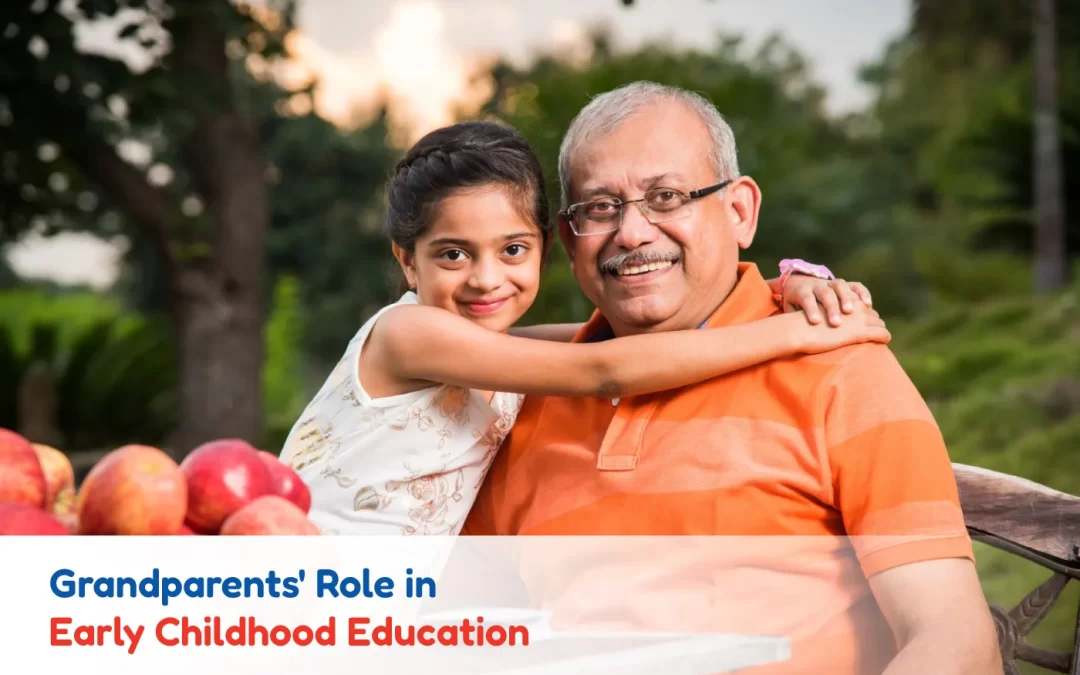In today’s fast-paced world, the value of family relationships is seldom highlighted, particularly when raising young children. With more and more families breaking away from the joint family structure, children spend very little time with their grandparents. Grandparents play a vital role in shaping child’s early education and help establish family values, traditions, and wisdom that shape the child’s character.
Grandparents Role in Early Childhood Education:
Grandparents contribute valuable life experience, patience, and love to a child’s early education. Unlike parents, who sometimes have to balance work and parental duties, grandparents may have more time for leisurely, one-on-one interactions with their grandchildren. They also have a passion for narrating anecdotes from their childhood, which forms a powerful bond between them.
Cultural Sensitisation and Storytelling:
Grandparents make vital contributions to cultural education. They pass down family history, customs, and cultural beliefs using stories, anecdotes, and personal experiences. This narrative is more than just a source of amusement; it is also an effective instructional tool.
Children discover their origins, appreciate the value of family, and develop a sense of identity and belonging. Grandparents’ stories frequently include moral lessons, giving children early exposure to ethics and values.
Grandparents’ stories are often about tenacity and determination in the face of adversity, as well as family bonds.
Emotional and Social Learning:
Grandparents significantly influence the emotional development of young children. Their nurturing presence instills a sense of security and stability, which is critical for emotional growth. As they spend time with their grandchildren, the child learns empathy, kindness, and the value of family relationships. Grandparents have the time and patience to participate in activities encouraging social development, such as playing games, cooking, or gardening.
Literacy and Numeracy Skills:
Grandparents frequently contribute to their grandchildren’s early literacy skills in informal but meaningful ways. Reading books, singing songs, and playing counting games are everyday activities that help a child’s cognitive development. Watching a grandparent read the newspaper may introduce youngsters to books, instill a love of reading, and help them develop language abilities.
Enhanced Cognitive Development
Children who interact with their grandparents regularly generally demonstrate improved cognitive abilities. Their interactions and activities expose children to a larger vocabulary, complicated ideas, and alternative ways of thinking. This intergenerational connection stimulates the child’s brain in ways that supplement conventional education by developing critical thinking, creativity, and problem-solving abilities.
Developing Life Skills:
Grandparents are frequently the custodians of practical knowledge and life skills that formal education may not stress. Teaching a youngster how to bake, draw, crochet, plant, or fix something is a fantastic learning experience. They instill in children patience, perseverance, and the gratification of making something with their hands. Furthermore, these life skills help a child develop independence and confidence.
Developing Resilience and Perspective:
Grandparents teach youngsters about resilience and tenacity by sharing their life tales and experiences. They demonstrate how problems may be conquered, imparting hope and perspective in young minds. Understanding that their grandparents faced and overcame adversity can help children develop a resilient mindset, essential for their emotional and psychological well-being.
Provide Opportunities for Interaction:
Regular and meaningful connections between grandparents and grandchildren are encouraged. If distance is a barrier, this could be accomplished through scheduled visits, collaborative activities, or even virtual meetings. Families might design activities based on the grandparents’ talents and hobbies, such as cooking, gardening, or arts and crafts.
Include Grandparents in Educational Activities:
Parents can engage grandparents in a early childhood education of the child by involving them in activities such as reading sessions, homework assistance, and outings. A visit to a museum with a grandparent, for example, can be a valuable educational experience, providing insights into history, art, and science through the grandparent’s knowledge and perspective. The same can be achieved through a visit to a temple, the ancestral home, or the grandparent’s workplace.
Value Their Input and Experience:
It is critical for parents to realize and appreciate the educational role grandparents perform. Encouraging grandparents to share their knowledge, experiences, and values with their grandchildren can help the youngsters learn more effectively.
Grandparents talk about their siblings and arrange family gatherings that include generations, helping children understand the wisdom and experiences that come with age. Grandparents instill the importance of cherishing and valuing people of all generations, fostering empathy, compassion, and deep respect for older people.
Conclusion
Grandparents and grandchildren benefit from each other. For children, learning from their grandparents provides a perspective on life and the lifestyle of the earlier generations. For grandparents, the interaction and bond bring joy, a sense of purpose, and mental stimulation, and it’s good for their overall health.
Grandparents are a wealth of information, wisdom, and affection, making them excellent catalyst to early childhood education. Their involvement enhances the child’s early learning experience by providing cultural information, emotional support, and practical life skills to supplement formal schooling. By cultivating strong relationships between grandparents and grandchildren, families can ensure that this bond plays a vital role in the child’s development, shaping well-rounded individuals with a thorough understanding of their heritage, values, and the world around them.

